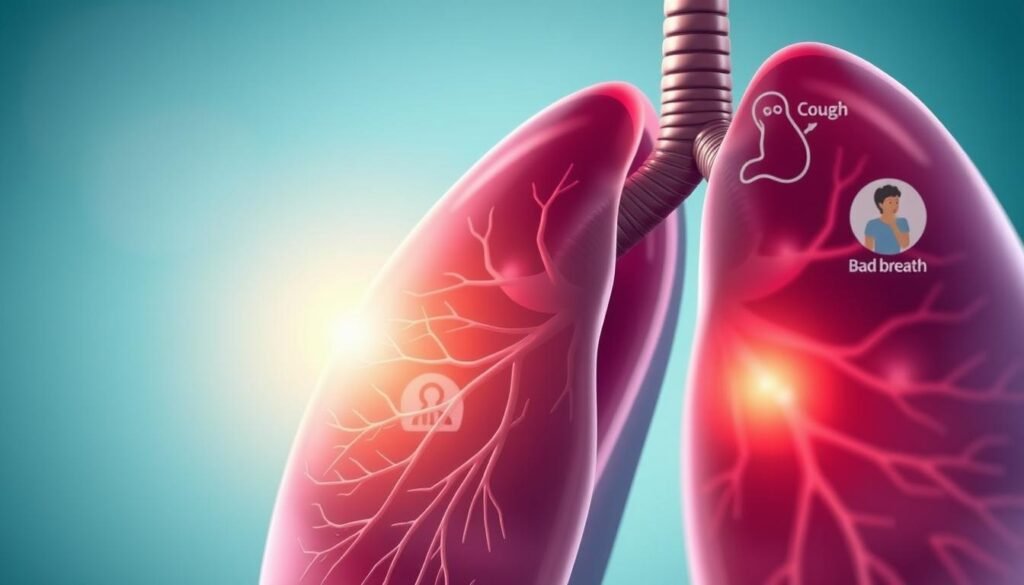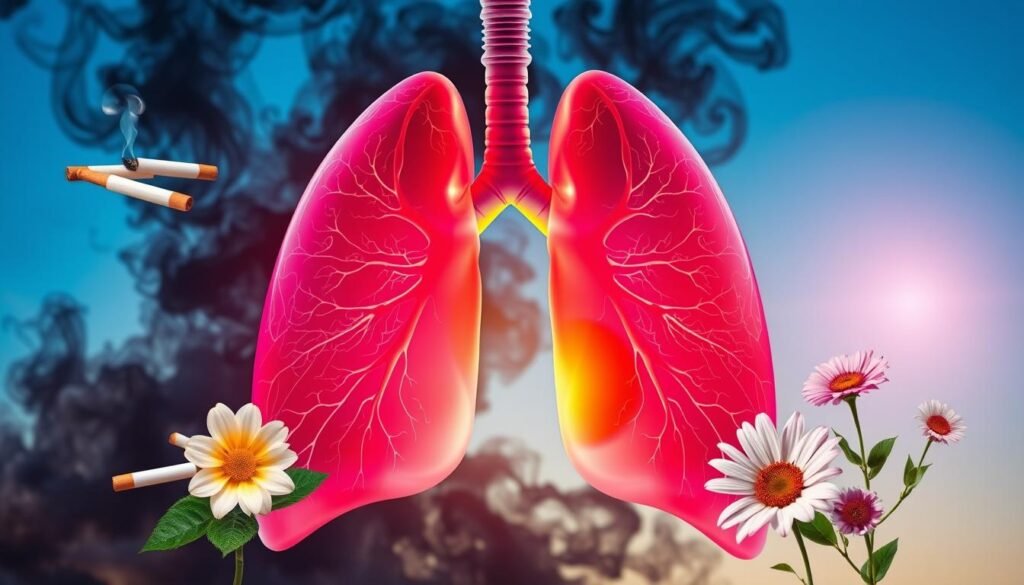Recent studies show that people with lung cancer may have lower levels of compounds like acetone and methanol in their breath. This finding highlights how lung cancer might change the way your breath smells. It sheds light on a lesser-known sign of the disease. Knowing if lung cancer can cause bad breath is key for catching it early. If you notice odd smells in your breath, it could lead to an early diagnosis.
Understanding why bad breath happens and its link to lung cancer is important. Patients often miss these small changes in how their breath smells. But these changes can signal bigger health problems. This article explores how lung cancer and bad breath are connected. It also shows why finding and treating cancer early is crucial.
Key Takeaways
- Lung cancer can lead to changes in breath odor that may go unnoticed.
- Lower levels of specific compounds in breath could indicate lung cancer.
- Smoking not only raises the risk of lung cancer but also contributes to halitosis.
- Good oral hygiene is imperative for managing bad breath.
- Consulting a healthcare professional for persistent bad breath is essential.
- Advancements in breath analysis technology may aid in the early detection of lung cancer.
Understanding Lung Cancer and Its Effects
Lung cancer starts when lung cells grow without control. This growth messes up normal body functions. It affects nearby tissue and causes symptoms like a long-lasting cough, chest pain, and losing weight without trying. Lung cancer and breathing diseases together make things harder for patients. They deal with symptoms that look like other health problems.
Studies show lung cancer can change how a person’s breath smells. This is due to changes in how the body works. The body releases certain chemicals into the air we breathe out. These chemicals can be different in each person. They might help doctors find cancer early. But there’s no single “cancer smell” because of the many types of cancer and lung diseases.
Lung cancer can also make bad breath worse. Treatments like chemotherapy and radiation can cause dry mouth and sores. These side effects can make breath smell bad. It’s important to look closely at all symptoms during lung cancer. This helps in understanding the disease better.
The Role of Volatile Organic Compounds (VOCs) in Breath
VOCs are key in checking health through breath analysis. They enter the air we breathe out. Factors like diet and gut health affect them. Specific VOCs could show cancer signs, changing how breath smells. Researchers are digging into this, especially for finding cancer.
VOCs are found inside and outside. Inside, they’re in paint, varnishes, and household stuff. Tobacco smoke is a big indoor source too. Outside, they come from fuel and factories. Breathing them in can cause health problems. This includes irritation, nausea, and cancer. Spotting VOCs in breath helps to find diseases early, like lung cancer.
Scientists have found thousands of VOCs in our breath. About 3,481 can be found, with 200 seen in one person using special tests. These tests, like GC/MS, check both healthy and sick people’s breath. They show differences tied to health problems, like lung cancer.
Using VOCs to find cancer looks promising. One review looked at 2268 papers on this. It focused on lung cancer and 33 studies on VOCs. Better tests and data could make this a strong tool. It could lead to early cancer detection, helping patients sooner. To learn more about how lung cancer and allergies are connected, click here.
Does Lung Cancer Cause Bad Breath
Lung cancer may change how your breath smells. This smell is often unique. It’s believed these changes come from certain chemicals the body releases.
Changes in Breath Odor Associated with Lung Cancer
Those with lung cancer might notice a musty or rotten fruit smell. Research shows specific chemicals are more common in these patients’ breath. This can help doctors find the disease early, which is crucial.
Comparison with Other Diseases and Conditions
Bad breath can vary with different diseases. For example, diabetes can make breath smell fruity. But lung cancer breath comes from different chemical changes in the body. Recognizing these smells can be a key step in getting the right help.
Common Symptoms of Lung Cancer
It’s important to catch lung cancer symptoms early. Some symptoms may be hard to notice at first. These include a long-lasting cough, pain in the chest, and feeling short of breath. Sometimes, a change in the smell of your breath can be a clue.
This is especially true for those who are at higher risk.
Identifying Lung Cancer Symptoms Early
Spotting lung cancer early can make a big difference in treatment. Look out for these signs:
- Persistent cough that doesn’t improve
- Coughing up blood
- Chest pain, particularly with deep breathing or coughing
- Hoarseness
- Loss of appetite
- Unexplained weight loss
- Shortness of breath and fatigue
- Recurring infections, like bronchitis or pneumonia
- New onset of wheezing
- Swollen lymph nodes
Being mindful of these signs is key. They might prompt you to get a checkup if you notice them often.
Link Between Bad Breath and Other Symptoms
Bad breath often joins other cancer signs. If you’re losing weight without trying or have a lasting cough, pay attention. Breath changes, not caused by food, should be talked about with a doctor. This is important to figure out if it’s cancer or something else.

Understanding Halitosis: The Medical Term for Bad Breath
Halitosis, known as chronic bad breath, impacts almost half of all people at some point. This issue can bring real discomfort and worries about social acceptance. It’s big in the USA, hitting up to 50% of folks. Overseas, like in China, it ranges from 6% to 23%. In India, around 21.7% of male dental students face it.
The risk of getting halitosis goes up with age. It tends to hit older people more. It’s the third biggest reason why people see a dentist. Many say it’s among the top 100 worst health problems one can have. It truly affects everyday life.
Several things can cause halitosis. Here are some common reasons:
- Poor oral hygiene
- Gum disease
- Bacteria buildup on the tongue
- Dry mouth
- Foods like garlic and onions
- Health conditions, like respiratory infections, diabetes, or liver problems
- Using tobacco products
For those who use tobacco, the risks go beyond just bad breath. They’re more likely to face gum disease, lose their taste sense, have sore gums, and can even get oral cancer. Dentists check for halitosis by looking at health history and smelling the mouth. They aim to find the root cause. Treatment varies, focusing on things like better dental care, treating gum disease, or dealing with other health issues.
To avoid halitosis, try:
- Seeing your dentist regularly
- Brushing and flossing every day
- Keeping your tongue clean
- Looking after any dentures well
- Quitting smoking
- Boosting saliva flow, either through your diet or with substitutes
Understanding the value of good oral hygiene is key to battling halitosis. It leads to better breath and a healthier life.
Smoking Effects on Breath and Health
Smoking has a big impact on breath and overall health. It leads to problems like bad breath or halitosis. This happens because smoking dries out the mouth and changes the balance of bacteria.
People who smoke often find it hard to keep their breath fresh. They struggle even with regular brushing and flossing.
How Smoking Contributes to Halitosis
Smoking puts harmful chemicals in your mouth, causing a lasting bad odor. The tobacco smell is unpleasant. And smoking makes your mouth dry by cutting down on saliva.
Saliva is important. It helps neutralize acids and clean away food bits. With less saliva, the risk of bad breath goes up. This shows the direct effect smoking has on causing halitosis.
Quitting Smoking and Improving Breath
Stopping smoking can make your breath smell better over time. Once you quit, your mouth gets moist again. This helps bring back the right balance of bacteria and lessens bad odor.
The perks go beyond just having fresh breath. Better mouth health helps your overall health too. This is key for those dealing with serious issues like lung cancer. Quitting smoking is crucial for better breath and health in the long run.

Dental Health and Bad Breath Causes
Good dental health is key in fighting bad breath. Not following oral hygiene can lead to bad breath. This happens due to bacteria that produce smelly gases.
Brushing, flossing, and dentist visits can get rid of these smells. If we ignore these habits, we might miss serious health signs.
The Importance of Oral Hygiene
It’s critical to keep your mouth clean to have fresh breath. This includes:
- Brushing teeth at least twice a day.
- Flossing daily to remove food particles lodged between teeth.
- Cleaning the tongue to prevent bacteria buildup.
- Using mouthwash to help eliminate odors.
What you eat also affects your breath. Foods like garlic and onions, and drinking coffee, can make it worse. Smoking and drinking alcohol can also cause dry mouth. This lets bacteria grow.
Common Oral Health Issues Leading to Halitosis
Several issues can cause halitosis:
| Oral Health Issue | Description |
|---|---|
| Cavities | Decayed areas in teeth that can harbor bacteria. |
| Gum Disease | Plaque buildup on teeth and gums causing chronic bad breath. |
| Dry Mouth (Xerostomia) | Persistent dryness allowing odor-causing bacteria to flourish. |
| Infections | Infections in the throat, nose, or lungs can lead to bad breath. |
Dentist check-ups are crucial for spotting and fixing these problems. Skipping oral care can hide bigger health issues. It’s important to take action and care for your mouth.
Potential Connection Between Cancer Treatments and Breath Changes
Cancer treatments can lead to many side effects, including changes in oral health and breath. People getting these treatments might notice differences in how things taste and smell. This can change the way their breath smells. Studies find that 35 to 69% of lung cancer patients have altered taste during treatment.
Changes in taste are noted by 45-84% of people on chemotherapy. Changes in smell are reported by 5-60% of these individuals. These changes can be due to less saliva, mouth sores, or dry mouth. These are common with chemotherapy, radiation therapy, and surgery. This makes it hard to keep up with oral hygiene, raising the risk of bad breath.
Cancer treatments can also affect patients’ mental health. They might feel more anxious or depressed. This is often linked to their changes in taste and smell. Managing these changes carefully is important to help with potential breath changes.

| Type of Cancer Treatment | Prevalence of Taste Changes (%) | Prevalence of Smell Changes (%) |
|---|---|---|
| Chemotherapy | 45-84 | 5-60 |
| Radiation Therapy | 66 | N/A |
| Both Treatments | 76 | N/A |
It’s important to understand how cancer treatment can affect breath. Addressing these issues can greatly help patients improve their life quality.
Maintaining Good Oral Hygiene Practices
Keeping your teeth and gums healthy is key to avoiding bad breath. It helps promote a clean mouth. Following simple oral hygiene tips can change a lot.
Tips for Preventing Bad Breath
To keep your breath fresh, a daily oral care routine is important. Here are some good habits:
- Brush twice daily: Use fluoride toothpaste to effectively remove plaque.
- Floss daily: Regular flossing prevents food particles from accumulating between teeth.
- Stay hydrated: Drinking enough water fights dry mouth, which can cause bad breath.
- Use antibacterial mouthwash: This helps to kill bacteria that contribute to halitosis.
- Scrape your tongue: A tongue scraper can remove bacteria from the tongue’s surface.
- Avoid certain foods: Try to eat less of foods like garlic and onions that smell strong.
- Chew sugarless gum: This increases saliva flow, helping fight dry mouth.
When to See a Dentist or Doctor
If bad breath doesn’t go away with these steps, see a dentist. Bad breath that stays can be a sign of other health issues. Things like a lasting bitter taste or a very dry mouth are signs to see a doctor. Talking to a dentist can help catch problems early. Don’t ignore these signs, as they could lead to bigger health problems.
Research and Innovations in Breath Analysis for Cancer Detection
Recent advancements in breath analysis offer new hope in detecting cancer. This method analyzes compounds in our breath to find cancer signs, focusing on lung cancer. Studies show that exhaled breath can change when diseases are present, revealing over 3000 volatile organic compounds (VOCs). Certain VOCs, like hydrogen sulfide and methyl mercaptan, differ notably between cancer patients and healthy folks.
Electronic noses (e-noses) are making breath analysis more practical for everyday use. These devices quickly examine the patterns of VOCs in our breath. This method is non-invasive, unlike some other tests. Gas chromatography and mass spectrometry (GC-MS) are top technologies here. They accurately analyze the VOCs.
Research in cancer detection is also exploring new uses beyond finding diseases. For example, wearable tech like breath sensors in masks could change how we monitor health in real-time. This is a non-invasive way to help diagnose health issues.
The future looks bright for breath analysis in early cancer detection, thanks to IoT and machine learning. These technologies could make breath tests even more accurate and timely. As studies go on, this approach may greatly improve how we catch and treat cancer early on.
Conclusion
Knowing how lung cancer and bad breath are related is key for awareness and early detection. The presence of certain chemicals in breath might signal health problems, including lung disease. When people notice their breath smells different or bad all the time, it’s important they see a doctor.
Changes in breath should never be ignored because they can offer clues about your health. Studies show tools like electronic noses are great for checking breath easily and without hurting. These tools help doctors find lung cancer early, which can save lives. You can learn more by reading this review article.
Talking openly with doctors about any new or strange symptoms is crucial for good health. If you’re worried about bad breath and its possible connection to serious diseases, make sure to get regular health checks. Staying up-to-date on lung cancer research can also help. Being informed and alert is the first step to catching lung problems early.